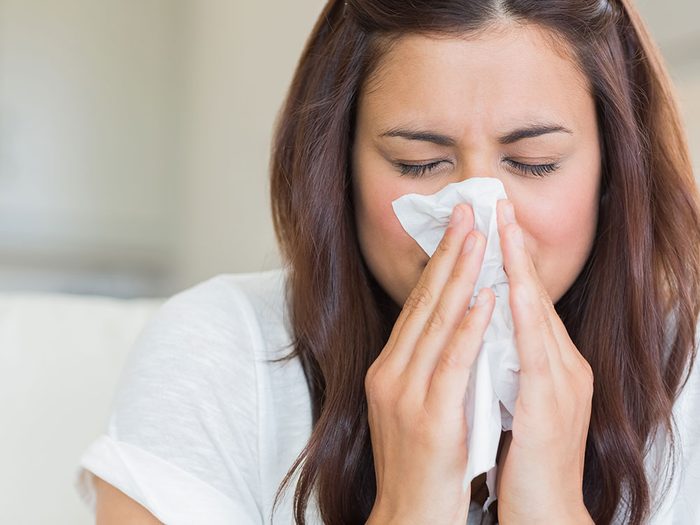
1. Sex Reduces Stress
Feeling stressed? Some sexual healing may be just the relief you crave. According to a study conducted at the University of Paisley in Scotland and published in Biological Psychology in 2006, when subjects had sex, their blood pressure reacted less to stressful activities (public speaking and mental arithmetic) than when they engaged in other sexual activities or none at all.
Among the possible reasons: “It’s a pleasurable, enjoyable activity and many people sleep better after sex,” says Robin Milhausen, assistant professor of human sexuality and family relations at the University of Guelph.

2. Sex Burns Calories
Okay, we can’t claim that sexercise burns as many calories as running or an aerobics class, but getting between the sheets for an hour will burn about 275 calories (for a 150-pound person). Now, don’t expect it to affect the scale that much—you need to burn 3,500 calories to lose a pound. But every little bit helps; and it’s a heck of a lot more fun that sit-ups.
Additionally, when you’re physically active during sex, says Milhausen, your cells, muscles and organs are getting fresh oxygen, which is good for your body.

3. Orgasms Can Help Reduce Pain
If you’re thinking of laying on that old excuse, “Not tonight, honey, I have a headache,” maybe you should reconsider. In her latest book, The Science of Orgasm, co-author Beverly Whipple, explains that at orgasm, the “love hormone” oxytocin surges and there is a marked reduction in sensitivity to pain, to about half that of the resting level. And although relief of migraine through orgasm is less reliable and effective than relief through prescription drugs, the analgesic effect is more rapid.
That said, any effects would be limited, cautions Milhausen. “During the time of orgasm and directly thereafter, it can increase your tolerance to pain, but it’s not a long-term solution. You can’t run a marathon and avoid pain because you had sex hours before the race.”

4. Sex Can Boost Your Immunity
In the book Feeling Good Is Good For You, co-author Carl J. Charnetski mentions a study he and other scientists conducted at Wilkes University in Wilkes-Barre, Penn., where they asked 112 men and women about their frequency of sex and measured the level of an antibody called immunoglobulin A (IgA), which can protect against colds and flu. People who reported having sex once or twice a week had higher IgA readings than those who had sex less than once a week or not at all. They also had higher measurements, however, than those who had sex three or more times a week
As to why IgA decreased after a certain point, Charnetski speculates it may be a case of too much of a good thing, or perhaps the more sexually active group was using sex to cover up for uncertainty or anxiety over the state of the relationship.

5. Sex Can Make You Look Younger
Forget lotions and potions. The secret to the fountain of youth lies between your thighs. David Weeks, a clinical neuropyschologist at the Royal Edinburgh Hospital in Scotland and co-author of Secrets of the Superyoung, conducted a 10-year study involving 3,500 people and found that men and women who reported having sex an average of four times a week looked approximately 10 years younger than they really were.
Weeks proposes that hormones such as the growth hormone are partially behind the effect. However, he also cautions that casual sex with multiple partners may be stressful and lead to premature aging.
Check out these 10 Beauty Tricks That Turn Back the Clock!

6. Sex Can Help Lower Men’s Risk of Prostate Cancer
In 2003, a research team led by professor Graham Giles, director of the Epidemiology Centre at the Cancer Council Victoria in Australia found that the more frequently men between the ages of 20 and 50 ejaculate, the less likely they are to develop prostate cancer. Men in their 20s who ejaculated on average seven times a week or more were one-third less likely to develop aggressive prostate cancer when compared with men who ejaculated less than three times a week at this age.
The findings were consistent with an American study published in the Journal of the American Medical Association (JAMA) in 2004, involving approximately 29,000 men, which also found that high ejaculation frequency was related to a decreased risk of prostate cancer. One possible reason may be that frequent ejaculation prevents carcinogens from building up in the prostatic ducts.

7. Sex Can Strengthen Your Relationship
Maybe sex can’t fix everything, but the oxytocin released during orgasm brings about pair bonding, explains Milhausen. Data in a study Milhausen conducted also shows that sexual satisfaction and relationship satisfaction are interconnected.
“If things are going really well for you in the bedroom, that will likely filter into other areas of your relationship.” In Feeling Good Is Good for You, Charnetski says couples in good marriages or other intimate relationships are healthier than their unattached peers. They live longer, and good relationships buffer them against a variety of illnesses.